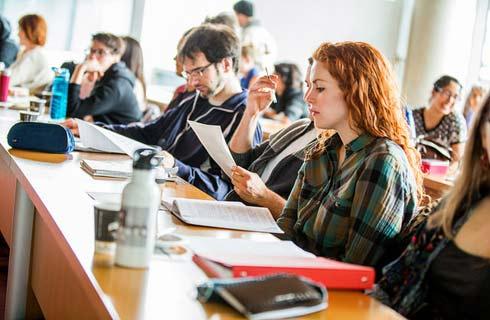- IDP China>
- 课程库>
- 工程与技术>
- 工程学及其相关技术>
- 电气电子工程技术>
- Bachelor of Engineering (Electrical and Renewable Energy) Honours
工学学士学位(电气和可再生能源)
Bachelor of Engineering (Electrical and Renewable Energy) Honours

学历文凭
Bachelor Degree with Honours

专业院系
School of Engineering

开学时间

课程时长

课程学费

国际学生入学条件
There are various ways to meet our admission requirements, such as:
Secondary school results
Successful completion of one year of tertiary study from a recognised institution
Completed Diploma program from a recognised institution
English competency requirements:
IELTS Academic: An overall band minimum score of 6.0, with no individual band less than 6.0. (Results are typically valid for 2 years and online tests are not acceptable.)
TOEFL iBT: 70 (no individual score less than 17)
TOEFL Paper-Based Test (PBT): Minimum score of 550, including Test of Written English of 5 or better. (Results are typically valid for only 2 years.)
Pearson Test of English (PTE) Academic: 52, with no scores less than 50. (Results are typically valid for only two years.)
IDP—雅思考试联合主办方

雅思考试总分
6.0
了解更多
雅思考试指南
- 雅思总分:6
- 托福网考总分:70
- 托福笔试总分:550
- 其他语言考试:Pearson English Test (PTE) Academic - 52 with no scores less than 50.
CRICOS代码: 092816J
申请截止日期: 请与IDP顾问联系以获取详细信息。
课程简介
Electrical and renewable energy engineering is a specialisation within electrical engineering concerning the generation of electrical power from a wide range of sources, and with a special focus on renewable energy sources. This includes solar, wind, hydro, biomass and geothermal, and the integration of these energy sources into hybrid energy supply and distribution networks. The course provides graduates with strong competencies in the fundamental electrical engineering discipline areas with particular focus on the utilisation, generation, management and design of renewable energy resources.<br>The program focuses on the development of knowledge and skills relevant to professional engineering practice and along with a sound theoretical base, includes strong elements of practical problem solving, team work and project development. As a result, as well as having multiple technical and transferable skill competencies, graduates will gain strong analytical skills, and have the ability to lead complex projects.<br><br>Course learning outcomes<br>Demonstrate advanced knowledge of the underpinning natural and physical sciences and in depth understanding of specialist bodies of knowledge within the electrical and renewable energy engineering discipline.<br>Think critically, and apply established engineering methods and research skills to complex electrical and renewable energy engineering problem solving.<br>Apply systematic engineering synthesis and design processes to conduct and manage electrical and renewable energy engineering projects, with some intellectual independence.<br>Demonstrate conceptual understanding of the mathematics, numerical analysis, statistics and computer and information sciences which underpin the electrical and renewable energy engineering discipline and fluently apply engineering techniques, tools and resources.<br>Demonstrate clear and coherent oral and written communication in professional and lay domains.<br>Demonstrate a global outlook and knowledge of contextual factors impacting the engineering discipline, including respect for cultural diversity and indigenous cultural competence.
相关申请
 预科
预科 奖学金
奖学金 实习机会
实习机会 在校学习
在校学习 跨境学习
跨境学习 校园授课-线上开始
校园授课-线上开始 在线/远程学习
在线/远程学习
学校排名

世界排名501
数据源:泰晤士高等教育世界大学排名
关于伊迪斯科文大学

埃迪斯科文大学(ECU)成立于 1991 年,是一所现代化的澳大利亚院校,以提供先进、前瞻性的课程而著称。ECU通过培养学生掌握专业领域职业所需的可迁移技能和知识,确保学生能够很好地满足未来社会的需求。在最新的《优秀大学指南》(2024 年)中,该校的教学质量被评为五星级,并已连续 17 年保持这一记录。这标志着ECU跻身于澳大利亚评级最高的大学之列(《2024年优秀大学指南》)。ECU 位于西澳大利亚州首府珀斯。珀斯以其一望无际的古老岩层景观、世界一流的葡萄酒庄、数千英里长的沙滩和清澈温暖的海水而闻名。珀斯是一座充满活力的城市,经济发展迅速,有众多景点、活动和文化供学生探索。ECU 有 250 多门课程。该大学的许多课程都是与专业合作伙伴合作开发的,以确保课程始终处于行业需求不断变化的最前沿。ECU 的众多课程还包括相关学科领域的职业模块和行业实习。这些独特的机会旨在培养学生的实际工作经验和强大的批判性思维能力,确保ECU毕业生具备在就业市场脱颖而出所需的一切条件。ECU 致力于打造一个热情好客的学习社区,拥有来自全球 100 多个国家的约 7000 名留学生。学校提供一系列支持服务,帮助 30000 名学生实现学业和个人发展。学校还提供各种奖学金和助学金,为来自不同背景的学生提供平等的学习机会。
本校相关课程

理学学士(物理学)荣誉
学历文凭
Bachelor Degree with Honours
开学日期
课程费用总额


文学士(艺术管理)
学历文凭
Bachelor Degree
开学日期
课程费用总额


教育领导力研究生证书
学历文凭
Graduate Certificate
开学日期
课程费用总额


公共卫生研究生文凭
学历文凭
Graduate Diploma
开学日期
课程费用总额


工程科学学士
学历文凭
Bachelor Degree
开学日期
课程费用总额


语言病理学学士
学历文凭
Bachelor Degree
开学日期
课程费用总额

其他相关课程

微电子与计算机工程理学硕士
 赫特福德大学
赫特福德大学泰晤士高等教育世界大学排名:601
学历文凭
Masters Degree (Taught)
开学日期
课程费用总额


Immersive Technology MSc
 伦敦大学皇家霍洛威学院
伦敦大学皇家霍洛威学院泰晤士高等教育世界大学排名:301
学历文凭
Masters Degree (Taught)
开学日期
课程费用总额


机电工程学士(荣誉学位)/电气与电子工程学士(荣誉学位)(093504F)
 纽卡斯尔大学
纽卡斯尔大学学历文凭
Dual Degree
开学日期
课程费用总额


MEng (Hons) Mechatronics Engineering
胡弗汉顿大学
泰晤士高等教育世界大学排名:601
学历文凭
Undergraduate Masters
开学日期
课程费用总额


电气与电子工程(荣誉)工学士(三明治)
 英国女王大学
英国女王大学学历文凭
Undergraduate Masters
开学日期
课程费用总额


电力电子与控制硕士
 赫特福德大学
赫特福德大学泰晤士高等教育世界大学排名:601
学历文凭
Masters Degree (Taught)
开学日期
课程费用总额


























